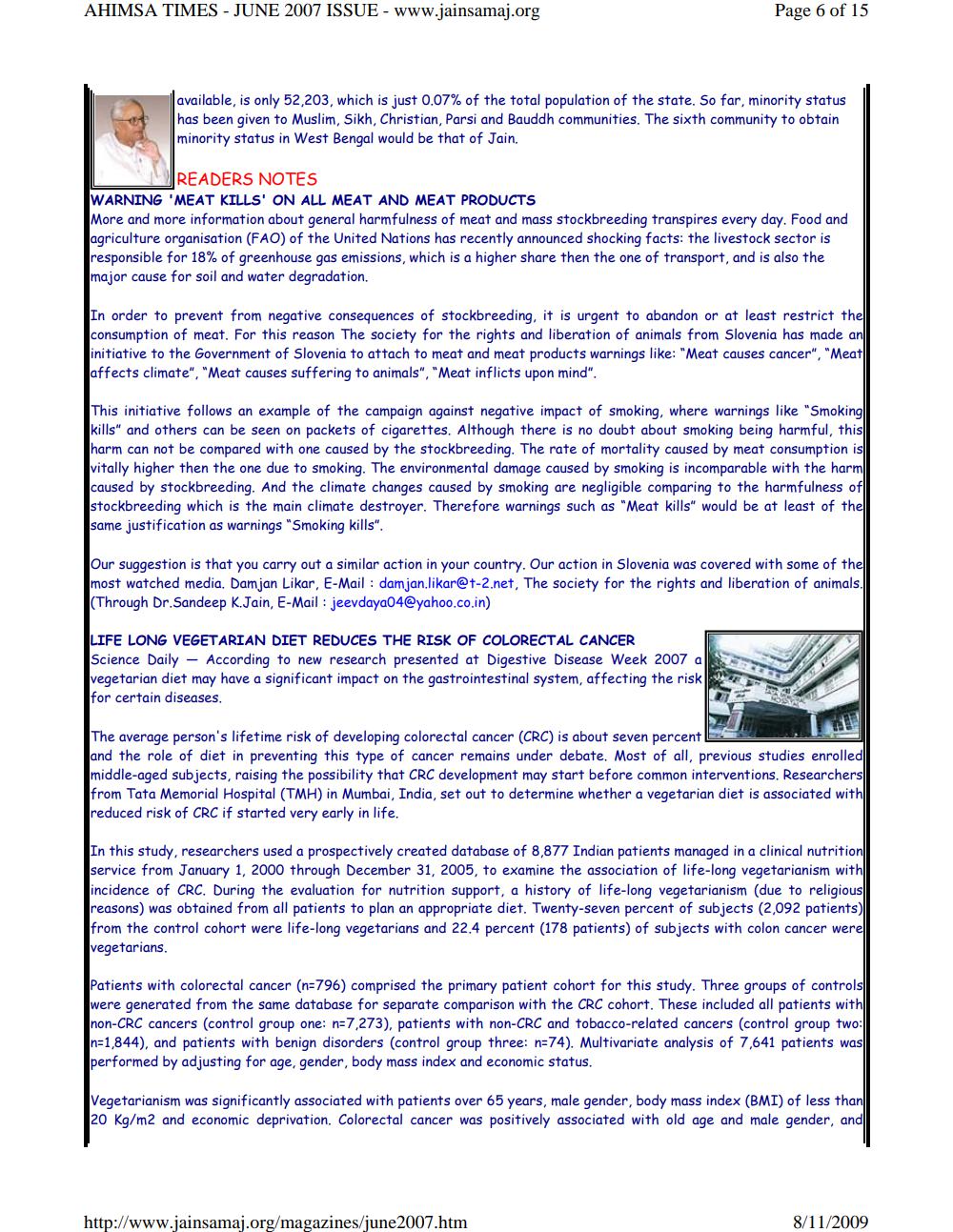________________
AHIMSA TIMES - JUNE 2007 ISSUE - www.jainsamaj.org
Page 6 of 15
available, is only 52,203, which is just 0.07% of the total population of the state. So far, minority status has been given to Muslim, Sikh, Christian, Parsi and Bauddh communities. The sixth community to obtain minority status in West Bengal would be that of Jain.
READERS NOTES WARNING 'MEAT KILLS' ON ALL MEAT AND MEAT PRODUCTS More and more information about general harmfulness of meat and mass stockbreeding transpires every day. Food and agriculture organisation (FAO) of the United Nations has recently announced shocking facts: the livestock sector is responsible for 18% of greenhouse gas emissions, which is a higher share then the one of transport, and is also the major cause for soil and water degradation.
In order to prevent from negative consequences of stockbreeding, it is urgent to abandon or at least restrict the consumption of meat. For this reason The society for the rights and liberation of animals from Slovenia has made an initiative to the Government of Slovenia to attach to meat and meat products warnings like: "Meat causes cancer", "Meat affects climate", "Meat causes suffering to animals", "Meat inflicts upon mind".
This initiative follows an example of the campaign against negative impact of smoking, where warnings like "Smoking kills" and others can be seen on packets of cigarettes. Although there is no doubt about smoking being harmful, this harm can not be compared with one caused by the stockbreeding. The rate of mortality caused by meat consumption is vitally higher then the one due to smoking. The environmental damage caused by smoking is incomparable with the harm caused by stockbreeding. And the climate changes caused by smoking are negligible comparing to the harmfulness of stockbreeding which is the main climate destroyer. Therefore warnings such as "Meat kills" would be at least of the same justification as warnings "Smoking kills".
Our suggestion is that you carry out a similar action in your country. Our action in Slovenia was covered with some of the most watched media. Damjan Likar, E-Mail : damjan likar@t-2.net, The society for the rights and liberation of animals. (Through Dr. Sandeep K.Jain, E-Mail : jeevdaya04@yahoo.co.in)
LIFE LONG VEGETARIAN DIET REDUCES THE RISK OF COLORECTAL CANCER Science Daily - According to new research presented at Digestive Disease Week 2007 a vegetarian diet may have a significant impact on the gastrointestinal system, affecting the risk for certain diseases.
The average person's lifetime risk of developing colorectal cancer (CRC) is about seven percent and the role of diet in preventing this type of cancer remains under debate. Most of all, previous studies enrolled middle-aged subjects, raising the possibility that CRC development may start before common interventions. Researchers from Tata Memorial Hospital (TMH) in Mumbai, India, set out to determine whether a vegetarian diet is associated with reduced risk of CRC if started very early in life.
In this study, researchers used a prospectively created database of 8,877 Indian patients managed in a clinical nutrition service from January 1, 2000 through December 31, 2005, to examine the association of life-long vegetarianism with incidence of CRC. During the evaluation for nutrition support, a history of life-long vegetarianism (due to religious reasons) was obtained from all patients to plan an appropriate diet. Twenty-seven percent of subjects (2,092 patients) from the control cohort were life-long vegetarians and 22.4 percent (178 patients) of subjects with colon cancer were vegetarians.
Patients with colorectal cancer (n=796) comprised the primary patient cohort for this study. Three groups of controls were generated from the same database for separate comparison with the CRC cohort. These included all patients with non-CRC cancers (control group one: n=7,273), patients with non-CRC and tobacco-related cancers (control group two n=1,844), and patients with benign disorders (control group three: n=74). Multivariate analysis of 7,641 patients was performed by adjusting for age, gender, body mass index and economic status.
Vegetarianism was significantly associated with patients over 65 years, male gender, body mass index (BMI) of less than 20 Kg/m2 and economic deprivation. Colorectal cancer was positively associated with old age and male gender, and
http://www.jainsamaj.org/magazines/june 2007.htm
8/11/2009




